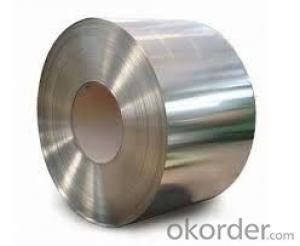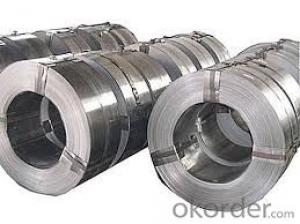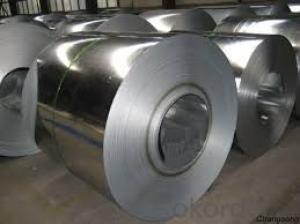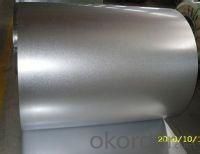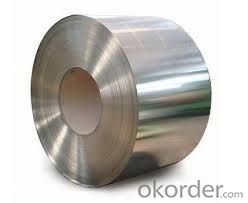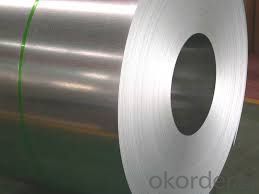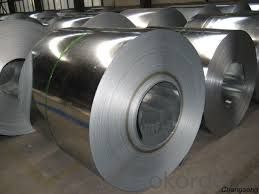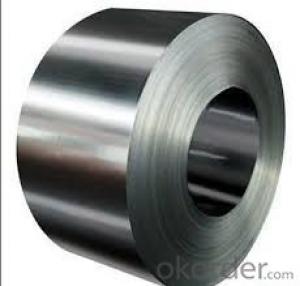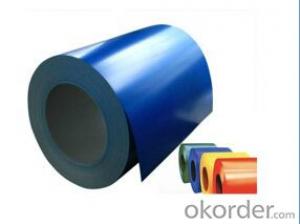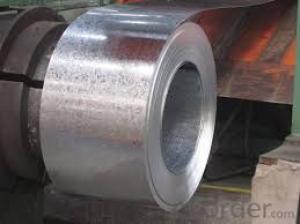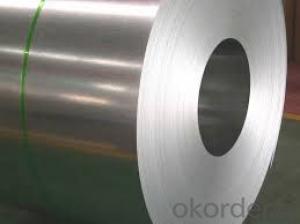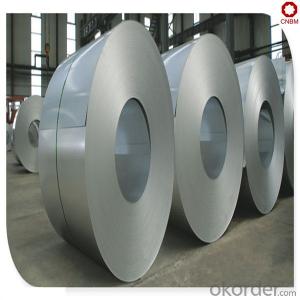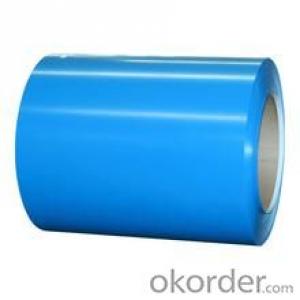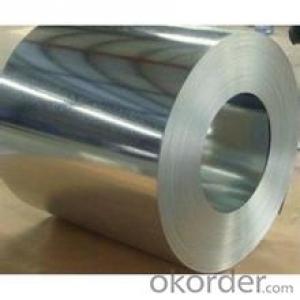Excellent Hot-Dip Galvanized/ Aluzinc Steel DX51D
- Loading Port:
- Nanjing
- Payment Terms:
- TT OR LC
- Min Order Qty:
- 30 m.t.
- Supply Capability:
- 5000000 m.t./month
OKorder Service Pledge
OKorder Financial Service
You Might Also Like
Description:
1.Mateials:SGCC,DX51D / DX52D /S250,280GD
2.Size:width:600-1250mm(900mm,1215mm,1250mm,1000mm the most common)
thickness:0.15-2.0mm
length:1000-6000mm,as your require
3.Zinc coating :60-180g( as required)
4.Coil id:508mm
5.Coil weight: 3-5MT(as required)
6. Surface:regular/mini/zero spangle, chromated, skin pass, dry etc.
Applications of our Galvalume Coil:
Galvalume Coil widely used for roofing products, It is also the ideal base material for Prepainted Steel Coil.
1. roofing
2. gutters
3. unexposed automotive parts
4. appliances
5. furniture
6. outdoor cabinetry
Hot-dip galvanized steel coils are available with a pure zinc coating through the hot-dip galvanizing process. It offers the economy, strength and formability of steel combined with the corrosion resistance of zinc. The hot-dip process is the process by which steel gets coated in layers of zinc to protect against rust. It is especially useful for countless outdoor and industrial applications.
- Q: How are steel coils used in the production of steel rings?
- Steel coils are used in the production of steel rings by being fed through a machine that cuts and shapes the coil into individual rings. These rings can then be further processed and manipulated to create a wide range of steel products, such as bearings, pipe fittings, or automotive components.
- Q: How do steel coils contribute to the manufacturing of household appliances?
- Household appliances rely heavily on steel coils, which are essential for their production. These coils, crafted from high-quality steel, are vital in providing the necessary strength and durability needed for manufacturing various appliances. One key application of steel coils in household appliances is their use in constructing the appliance's body or frame. These coils are shaped and molded into the desired structure, creating a robust foundation for the appliance. This ensures that the appliance can endure daily usage and remain intact for an extended period of time. Furthermore, steel coils are also employed in manufacturing different components within household appliances. For instance, refrigerators and air conditioners utilize steel coils in their condenser and evaporator coils, which are responsible for the heat exchange process. These coils enable efficient cooling or heating, guaranteeing optimal performance of the appliance. Moreover, steel coils find application in producing appliance interiors, such as oven racks, dishwasher baskets, and laundry machine drums. The strength and resistance provided by the steel coils help these components withstand heavy loads and repeated use, enhancing the overall longevity and reliability of the appliance. Additionally, steel coils contribute to the aesthetic appeal of household appliances. They can be shaped, molded, and coated to achieve various finishes, colors, and textures, enhancing the visual attractiveness of the appliance and making it more appealing to consumers. In conclusion, steel coils are indispensable in the manufacturing of household appliances as they provide strength, durability, and resilience to the structure, components, and interiors of these appliances. They play a crucial role in ensuring the performance, reliability, and longevity of these appliances, making them an integral part of the manufacturing process.
- Q: Why cold rolled stainless steel sheet is lower than cold rolled stainless steel coil?
- Hello! The reason is: 1. cold rolled flat plate is Kaiping;2. cold-rolled plates are negative tolerances.
- Q: What are the common coil packaging materials?
- The common coil packaging materials include stretch film, shrink wrap, steel strapping, and wooden or cardboard cradles.
- Q: So today I was bored and was reading a shotgun shell box,the box was slug 12ga.I noticed it said not to be used in Damascus steel or twist barrel.It was to my understanding that Damascus steel is very strong and many stories came from what it could cut when used in a blade or sword.The little bit of info that i could find was that Damascus used earlier in the turn of the century on shotguns should not be fired unless special maintenance has been given and check out by gunsmith.So is Damascus not strong like i thought and not be able to handle higher pressure or why the reason for the warning?*
- Damascus steel in gunmaking Prior to the early 20th century, all shotgun barrels were forged by heating narrow strips of iron and steel and shaping them around a mandrel.[22][23] This process was referred to as laminating or Damascus and these barrels were found on shotguns that sold for $12.[22][23] These types of barrels earned a reputation for weakness and were never meant to be used with modern smokeless powder, or any kind of moderately powerful explosive.[23] Because of the resemblance to Damascus steel, higher-end barrels were made by Belgian and British gun makers.[22][23] These barrels are proof marked and meant to be used with light pressure loads.[22] Current gun manufacturers such as Caspian Arms make slide assemblies and small parts such as triggers and safeties for Colt M1911 pistols from powdered Swedish steel resulting in a swirling two-toned effect; these parts are often referred to as Stainless Damascus.[24]
- Q: does he use a nylon guitar or steel?
- Clearly it's nylon strings. Didn't you ask this before? You can hear the difference in tone, and the construction of the guitar is different than a steel stringed model.
- Q: How are steel coils used in the manufacturing of marine equipment?
- Steel coils are used in the manufacturing of marine equipment as they serve as a primary material for constructing various components such as hulls, decks, and superstructures. The coils are shaped, cut, and formed into the desired shapes and sizes to create strong and durable structures that can withstand the harsh conditions of the marine environment. Additionally, steel coils are also used in the fabrication of marine machinery and equipment, including engines, propellers, and winches, due to their high strength and corrosion resistance properties.
- Q: what is the refining process doing to raw materials in steel
- The refining process removes impurities. Impurities are anything that is not iron (Fe). Most steels are at least 98% iron, with a fraction of a percent of carbon, a dash of manganese, and traces of sulphur and phosphorus. These are called carbon steels. The non-iron elements are impurities found with the iron in the ore. A certain amount of carbon and manganese is beneficial to the strength of steel, so part of the refining process is designed to control the carbon and manganese content to give desired properties to the steel. Sometimes small amounts of these are added in the process. Besides the common carbon steels, there are many alloys of steel in use today. Alloying is done after the steel is refined to over 98% iron, and while it is a liquid. Various elements are added to the steel in controlled amounts to give it special properties. These include silicon, aluminum, magnesium, vanadium, beryllium, nickel and chromium, and sometimes molybdenum, tungsten and titanium. Alloy steels are still mostly iron, ususally at least 95%, but some stainless steels are only 75% iron because of large amounts chromium and nickel added to the mix.
- Q: How are steel coils used in the manufacturing of automotive components?
- Steel coils are used in the manufacturing of automotive components as they serve as the primary raw material for producing various parts such as car bodies, chassis, and engine components. The coils are processed through a series of manufacturing techniques, including cutting, shaping, and welding, to transform them into specific automotive components. The high strength and durability of steel make it an ideal choice for these applications, ensuring the structural integrity and safety of the final automotive products.
- Q: How are steel coils coated to prevent rust and corrosion?
- Steel coils are coated to prevent rust and corrosion through a process called galvanization. This involves immersing the coils in a bath of molten zinc, which forms a protective layer on the steel surface. This zinc coating acts as a barrier, preventing oxygen and moisture from coming into contact with the steel, thus reducing the risk of rust and corrosion.
Send your message to us
Excellent Hot-Dip Galvanized/ Aluzinc Steel DX51D
- Loading Port:
- Nanjing
- Payment Terms:
- TT OR LC
- Min Order Qty:
- 30 m.t.
- Supply Capability:
- 5000000 m.t./month
OKorder Service Pledge
OKorder Financial Service
Similar products
Hot products
Hot Searches
Related keywords

